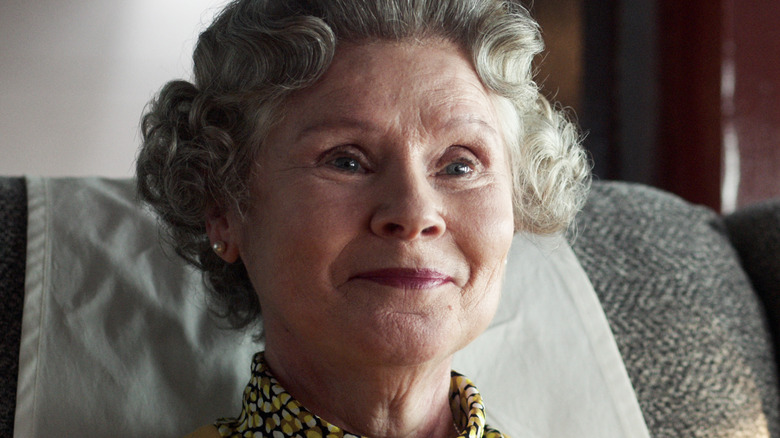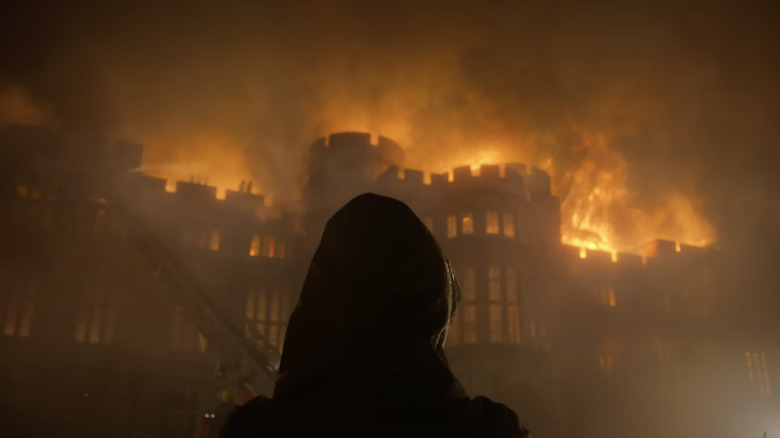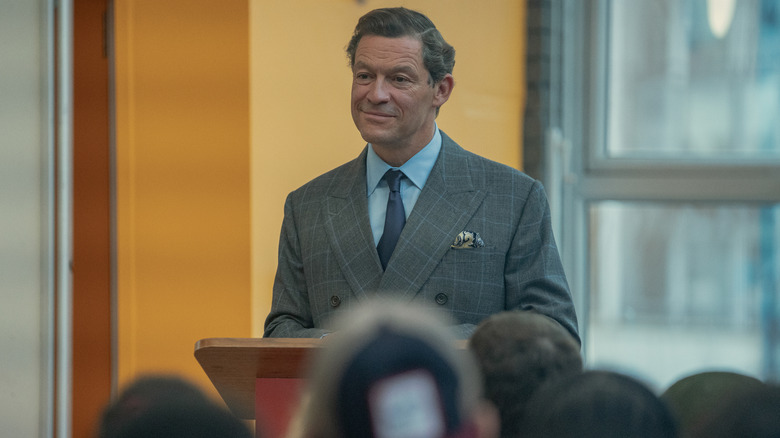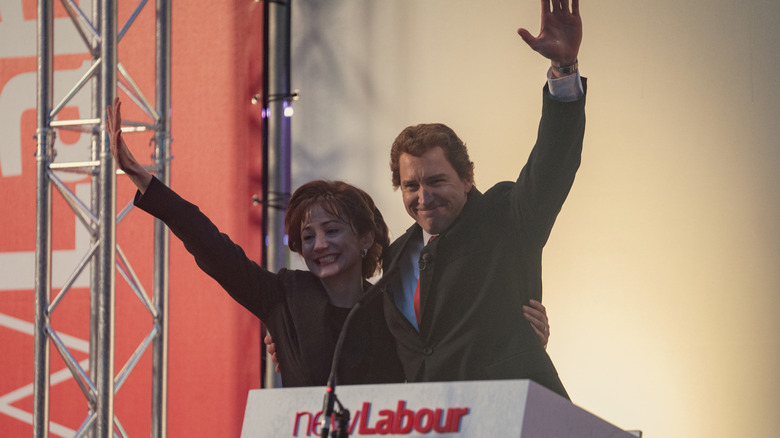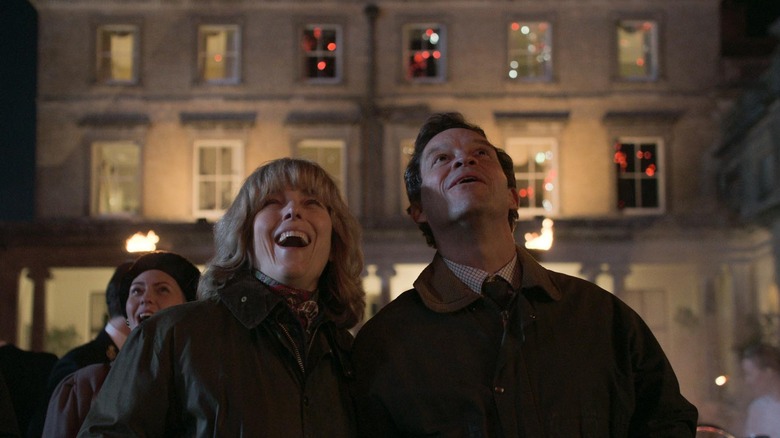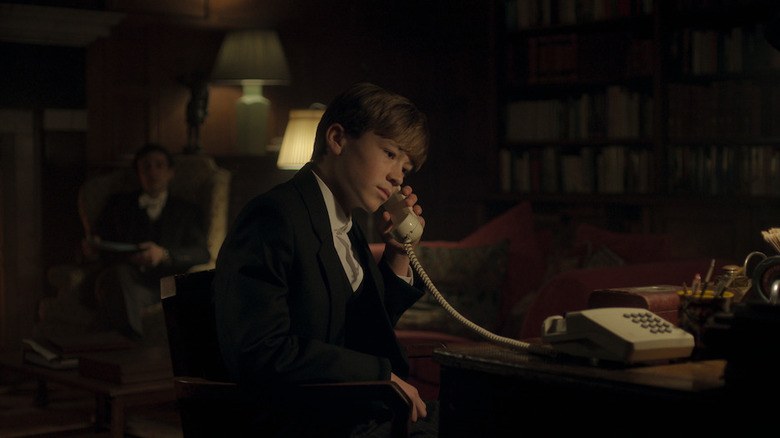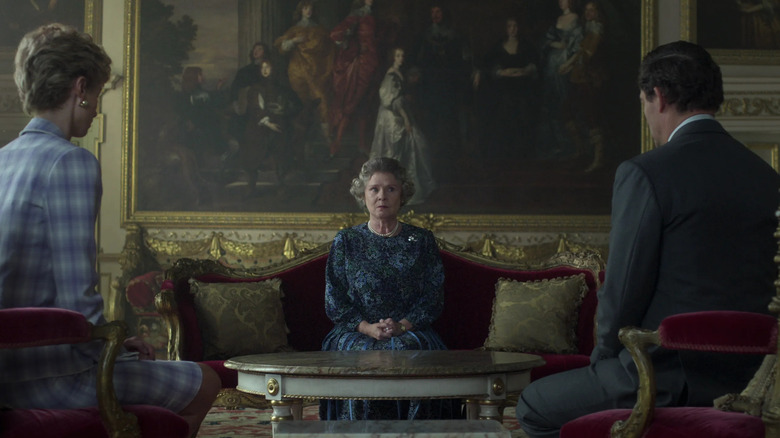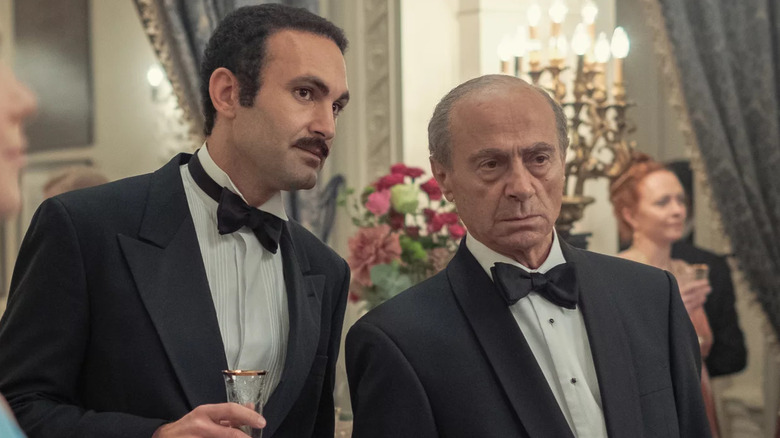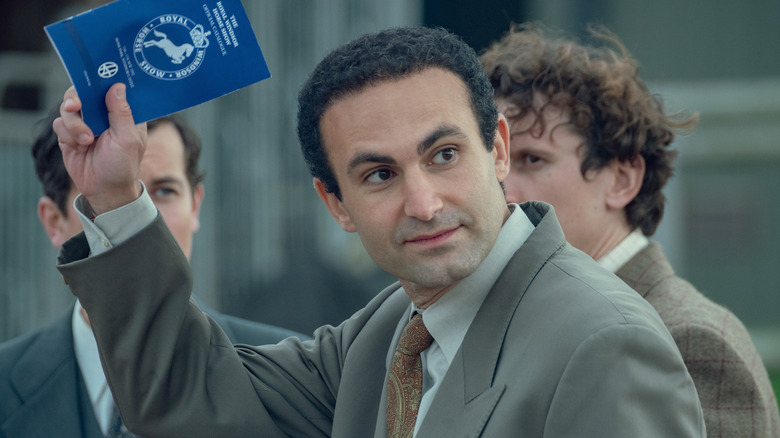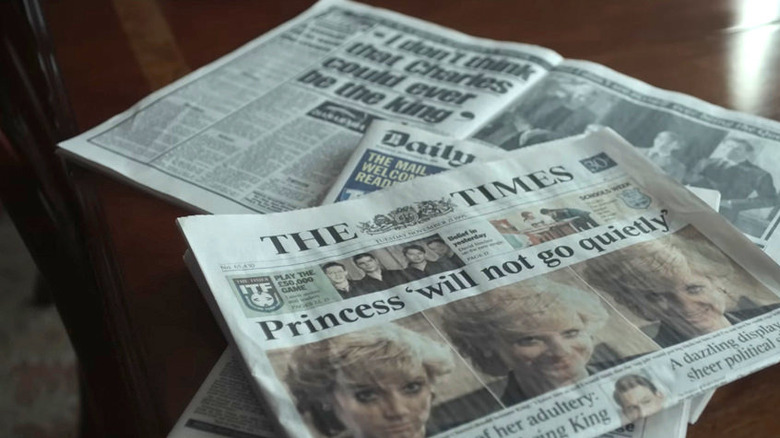The Ending Of The Crown Season 5 Explained
"The Crown" Season 5 appears to begin with a massive time jump. John Major has become prime minister, and the royal family has grown visibly older, thanks to their new actors. But in truth, only a year or two has passed since the end of "The Crown" Season 4, when Prime Minister Margaret Thatcher steps down and Charles and Diana's marriage hits a breaking point. Complicating matters even further, Season 5 begins with a flashback to 1953. The season continues to hop and skip around the 20th century, with visits to Russia, Egypt, Paris, Hong Kong, and Malibu, circa 1917, 1946, 1979, 1985, and 1997. Some of these scenes bring back previous cast members like Claire Foy, while others don't.
This might seem a little dauntingly complex. But thankfully, the primary timeline is as well-written as ever, and brims with a top-notch crop of performers. They do a bang-up job dramatizing the British monarchy during one of its most controversial periods, which encompasses multiple divorces, catastrophic fires, and tabloid scandals. As "The Crown" catches up to the present day, the events it covers will become more and more familiar to viewers, many of whom can remember watching them unfold live on their own television sets. This is exciting, but it can also be a little overwhelming: Season 5 traverses a lot of territory, and is always rich with symbolism, historical allusions, and intriguing tangents. Feeling a little lost in the wake of the final episode? Not to worry — we're here to help. This is the ending of "The Crown" Season 5, explained.
Metaphors abound
Season 5 of "The Crown" is packed with small details, major events, and shocking surprises. But above all, it's brimming with metaphors. It opens and closes with the most obvious, the Royal Yacht Britannia. We learn that HMY Britannia is Queen Elizabeth's favorite home, dearer to her than even her preferred castle, Balmoral. The grand boat has become synonymous with Elizabeth, largely because its trajectory conforms so closely to her own: She commissioned it early in her reign, rather than inheriting it from someone else. In its heyday, it was a symbol of Britain's global influence. But as it's aged, many have begun to think of it as an outdated and unnecessary behemoth. This is more than a little reminiscent of how many people feel about the monarchy as a whole, and even Elizabeth herself.
Episode 4, "Annus Horribilis," also uses the 1992 fire at Windsor Castle as a metaphor for the plethora of troubles faced by the British monarchy during that year. Though the royal family seeks to portray itself as a rarefied clan, rich in mystery and transcendence, they prove themselves to be no different or better than average Britons throughout 1992. Their messy marriages and divorces are especially vivid, making tabloid headlines throughout the 1990s. The fire symbolizes these stumbles, and also foreshadows the most explosive thing that happens in Season 5: The interview Diana grants to Martin Bashir on Guy Fawkes Night. He suggests she chose the date of the failed Gunpowder Plot to make a statement, while she insists such a plan is far from her mind. Regardless, the flames she fans are just as destructive as the ones that gut Windsor Castle.
Britain is changing
Season 5 of "The Crown" seeks to show just how much Great Britain changed during the 1990s. Most overtly, Episode 1, "Queen Victoria Syndrome," and Episode 10, "Decommissioned," explore public surveys regarding the monarchy that run in the paper and form the basis of a call-in show that airs on TV. In the latter episode, Elizabeth insists that the debate is going in their favor, but Princess Margaret raises an eyebrow in disagreement. She definitely has grounds: When presenters ask the audience if Britain needs a royal family, there are quite a lot of "no" votes visible.
The royally-chartered BBC is becoming a relic too. Board chair Marmaduke Hussey and director-general John Birt discuss Diana's Panorama interview, and Hussey laments what Britain would become without the twin institutions of the crown and the BBC. Birt replies, "an egalitarian modern republic." Gone are the days when one family and one channel dictated the culture — even Buckingham Palace gets a satellite dish this season. The BBC has to contend with hundreds upon hundreds of other networks, while the royal family must weather a storm of scandals that reduce the public's trust in them.
Just as the BBC loses viewers and the monarchy loses supporters, so too does the Commonwealth lose territory. In "Decommissioned," Charles travels to Hong Kong to preside over the transfer of rule from the United Kingdom to China. He's shocked by how easily they're replaced, and finds himself haunted by the change. That's the name of the game in Season 5: change, change, change.
Labour and Tony Blair are ascendant
Between Margaret Thatcher and John Major, there are 18 continuous years of Conservative Party rule over England. That also means two seasons of Conservative prime ministers meeting with Queen Elizabeth on "The Crown." But this streak stops with the landslide election of Tony Blair and his New Labour movement, which hands Major and his party a memorably massive loss.
During their last session together, Major confesses to Elizabeth that he deluded himself into believing he might win, despite the many polls indicating otherwise. The outgoing prime minister — who, it should be said, is an incredibly gracious loser — tells his sovereign that he hopes history judges his tenure more kindly than the electorate has. Elizabeth cushions his fall by assuring him he ranks quite highly on her personal list of prime ministers. Though this is cheering, Major concedes that Blair has captured the mood of the nation in a unique way. Crucially, he's young: As Elizabeth notes, Blair is 43, which makes him the youngest person to hold the position since 1812. This helps him maintain an energetic and future-facing image.
"The Crown" doesn't zoom out to depict the common people's opinions all that often, but it is peppered with hints that the people of Great Britain aren't happy with the Conservatives. Times are tough, and center-left Blair represents a fresh approach. Anyone who follows British news closely — or who's seen show creator Peter Morgan's 2006 film "The Queen" — knows that the rising political star has an important role to play in the events that the next season of "The Crown" will cover. But for now, he's just a bright new leader, symbolizing a country looking ahead.
Charles wants to have his cake and eat it, too
Thus far, "The Crown" has deftly illustrated the two paths available to someone born into the royal family. One can refuse what duty has thrust upon them, as when David chooses marrying American divorcee Wallis Simpson over remaining King Edward VIII. Or one can embrace said duty and follow the rules, as Queen Elizabeth does for so many years. Those who choose "the system" remain insiders, and enjoy all the power and privilege this entails. Those who don't become outsiders and suffer the consequences — though of course, outsider-dom is still pretty cushy. To varying degrees, Margaret, Anne, Diana, Charles, and a number of other characters risk outcast status to rid themselves of unhappy marriages. Though he doesn't pay the worst price, Charles is the only one of this group who is next in line to the throne. His consequences are appropriately unique.
Charles believes that the British people want a more modern monarchy that pays for itself and projects humanity, rather than divinity. He realizes he's unpopular at the moment because of his divorce, but he still sees a path forward for a twice-married king who cares about things like the environment and human rights, rather than pomp and circumstance. If wearing the crown was the only thing that mattered to Charles, he would stay by Diana's side and play his part, no matter what. But he's gambling that he can have his true love, Camilla, and the crown, if he plays his cards right. Of course, from the perspective of 2022, we know he wins that bet. He's currently king, and Camilla is his wife and queen consort. But in Season 5, he's marooned in scandal — and things just keep getting worse.
William is in the middle of the War of the Waleses
Separations and divorces are hard on children, and the royals are no exception. We don't get to see much of young Prince Harry in Season 5 of "The Crown," but we do get to see how the jagged fracture between Charles and Diana affects 13-year-old Prince William. He's in his first year at Eton, a prestigious all-boys boarding school. This storied place would be a nice respite, if not for the fact that his ancestors are the subject of his history lessons and his world-famous mother and father are constantly on the news. It's clear that William is close with his mother — he looks to her for assurance when he makes a mistake at his Eton signing ceremony — but it's just as clear that he feels the weight of expectation upon him as the eldest son and heir to the throne.
Like Elizabeth, William accepts that he's part of "the system," and seems content enough to fall in line, though he isn't overly emotive about it. But he protests when Diana mentions that she may have made a special friend in Dr. Khan, and admits to his grandmother that he's worried about her. William is in a delicate position here: He's close to his mom and grandmother in incredibly complex ways. To Elizabeth, he's both a beloved grandson (who can make sense of the new-fangled TV) and the eventual heir to the throne she currently occupies. To Diana, he's an adored son and a confidante. As Charles and Diana wage war and Elizabeth tries to manage the fallout, William is caught in the middle. It's a very difficult position to occupy.
Elizabeth and Diana are both lonely
There's a depressing irony in the tension between Elizabeth and Diana. It's no accident that Season 5 concludes with both women alone on yachts — they have a lot in common, despite everything that divides them. The princess and the queen are probably the two most recognizable women in the world, and are absolutely drowning in luxuries. And yet they're both completely adrift and totally isolated in the summer of 1997.
Initially, Diana hopes she can have a blissful and normal enough family life inside the gilded cage that is the royal family. When that becomes impossible, primarily because of Charles's pre-existing love for Camilla and the stifling pressure of the position, she wants out. She thinks freedom from Charles and duty might permit her a second chance at happiness, but her notoriety proves impossible to escape. It scares off friends and potential lovers, most prominently Dr. Khan. She finds herself estranged from almost everyone; her closest confidant seems to be her acupuncturist.
Meanwhile, Elizabeth exists outside of her own social circle — her ladies-in-waiting remark that she's not herself lately — and grows ever more distant from her husband. It's got to hurt that he's developed a relationship with the young and beautiful Penny Knatchbull, though he insists it's platonic. Even if it is, his respect for Penny's interest in history and carriage racing rankles, as he belittles Elizabeth for not reading enough and spending too much time with her dogs. Diana and Elizabeth are separated by generational and dispositional differences, but the sum of their lives has been the same. Though one of them rebels against "the system" and the other upholds it, as women, they're both chewed up and spit out by it. They could be each other's support, but because of the system, they're at odds.
Power plays galore
While Diana wants out of the royal family's orbit, two other characters are looking to work their way into it. In one of the strongest episodes of the season, Mohamed Al-Fayed, known to many as Mou Mou, goes from scrappy Coca-Cola street vendor to owner of the Ritz Paris and Harrods. His father loathes the British, but saves his harshest judgment for Egyptians who idolize them. Young Mou Mou doesn't agree. In fact, his father's dislike only makes him look up to the British more intensely. The Windsors provide him with a road map to supremacy that he can trace.
Eventually, the ambitious anglophile makes his way to England and the fringes of the monarchy. Acceptance into their inner circle would be proof positive that he's made it. Despite the queen's repeated shunning, he keeps playing the long game, which ultimately gets him seated next to Princess Diana. They find each other charming and forge a strong connection almost instantaneously.
Elsewhere, Camilla pulls off a power play of her own when she hires spin doctor Mark Bolland to reintroduce her to the public. Having decided that hiding behind curtains and speaking in code isn't a sustainable lifestyle, she's going for it — "it" being marriage to Charles and legitimacy within the royal family. For years, the tabloids have compared her unflatteringly to the much-ballyhooed Diana. But with Mark's help, Camilla hopes to redefine herself in contrast to the Princess of Wales' faults. She's undramatic and well-suited to the responsibilities of the job — but will this be enough to win the public over?
Dodi thinks he's in love
Mohamed Al-Fayed's expectations for his son Dodi are the cliff upon which Season 5 leaves its audience hanging. Dodi wants his father to meet his girlfriend Kelly, an aspiring actress from the United States. It's serious enough that Dodi proposes and intends to buy her a Malibu mansion. But first, he needs his father's approval. Mohamed agrees the girl is pretty, but he's bitterly disappointed that Dodi has wasted his gift with women (which he identifies as his son's one talent) on a girl who isn't his equal. He warns his son to be careful, implying Kelly is only with him for his wealth and Hollywood connections.
But really, Mohamed has his fingers crossed that Dodi will be able to pull off the very thing he's accusing Kelly of doing: marrying up. He has hopes his playboy son might land a high-status woman and marry above his station, which would give their family the type of clout that money can't buy. This doesn't mean he invites Diana aboard his yacht for the express purpose of playing matchmaker: Just hosting a royal — even a former royal — inflates his ego. But if the opportunity to swap a pretty American commoner for the Princess of Wales presents itself, this ever-striving businessman will take it.
Some fans may have expected Season 5 to include Diana and Dodi's doomed romance. Instead, they meet once at a polo match. How "The Crown" will depict their relationship (which is often misremembered in the public imagination) and Mohamed's part in it is a major question leading into Season 6.
Media scrutiny is reaching a tipping point
The press plays a larger role than ever before in Season 5 of "The Crown." In early episodes, the royal family often thinks they can use the media to control the narrative. Much of the time, they're right. But two problems persist and get progressively worse. First, as the years go on, the royals fail to remain a united front with one agreed-upon narrative. Second, the monarchy becomes a source of reality TV-style entertainment, with leaks and paparazzi photos fetching high prices. Once, publishers and broadcasters paid kill fees to hush up royal scandals. By the 1990s, spreading those scandals is a cottage industry.
Charles might resent that Diana outshines him in the papers, but he's using those very same papers to promote himself and cast doubt on his mother's leadership. Elizabeth has to befriend Penny in front of the cameras so that any pictures of Philip and his young female companion look less suspicious. Sarah, Duchess of York, is caught in a compromising position and splashed all over the tabloids. Charles and Camilla's intimate phone conversations ends up on the front page.
But Diana bears the brutal brunt of the media's attention. Andrew Morton persuades her to answer questions via tape recorder for a biography. Then Martin Bashir commits forgery to convince an already-paranoid Diana that everyone is out to get her. His deceit secures him an exclusive interview that rocks the royal family. This only increases public interest and demand for further coverage. Most viewers already know how Diana's story ends, which makes the cameras that are utterly ubiquitous by the end of Season 5 feel truly insidious.
